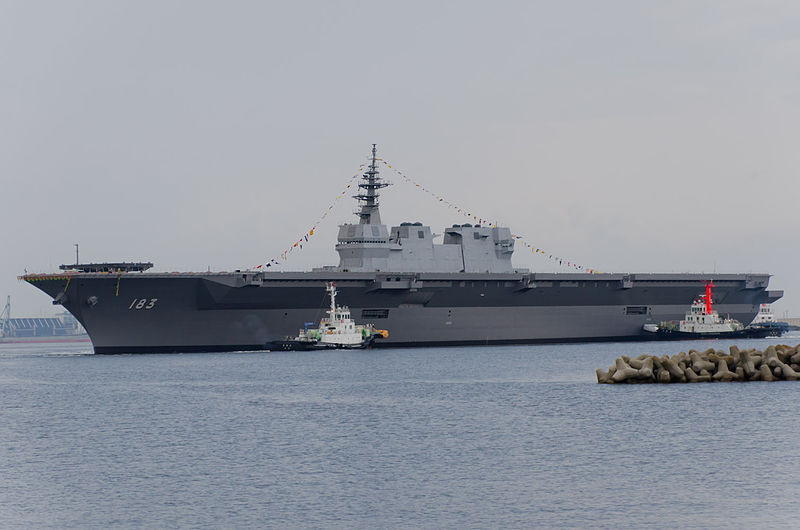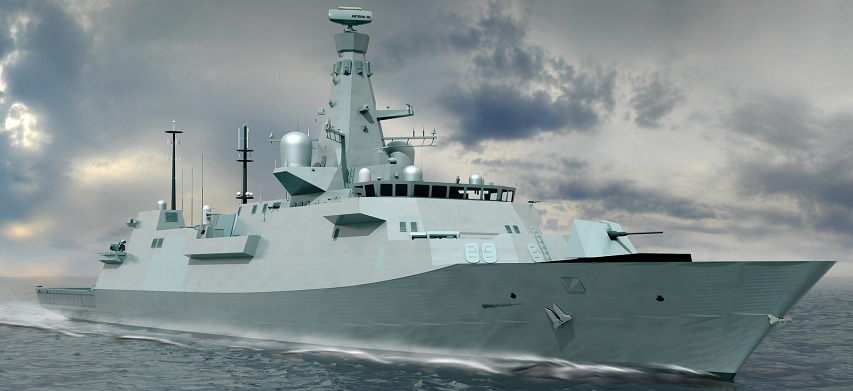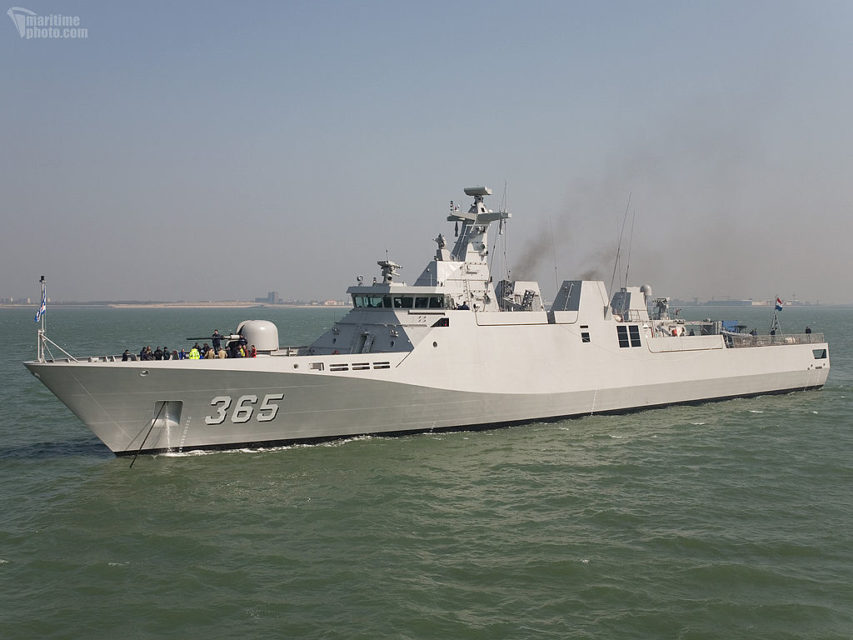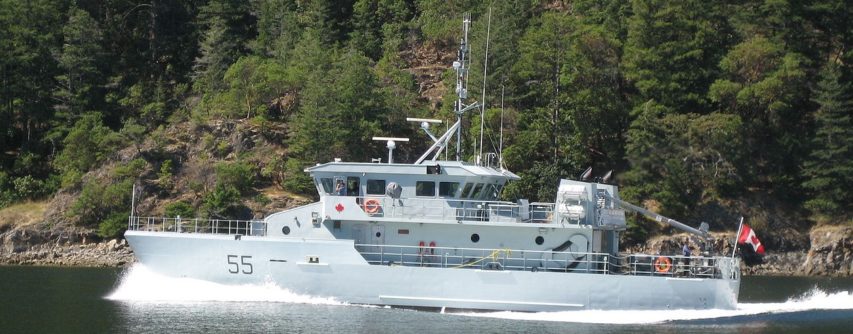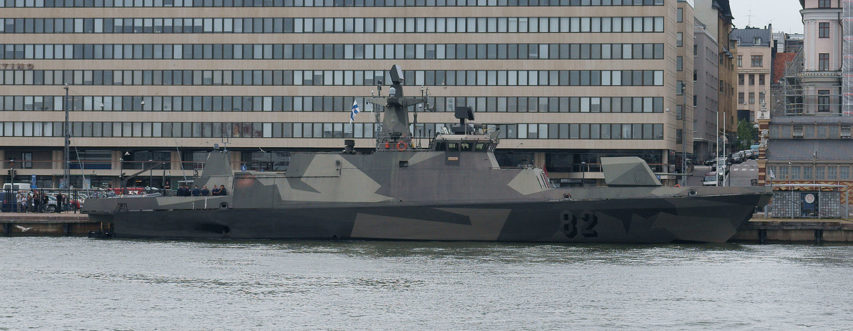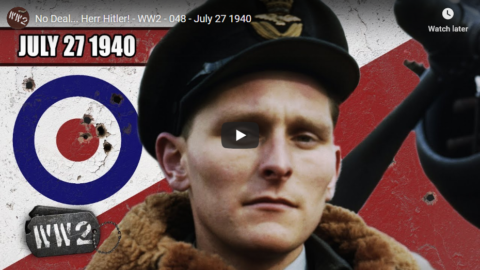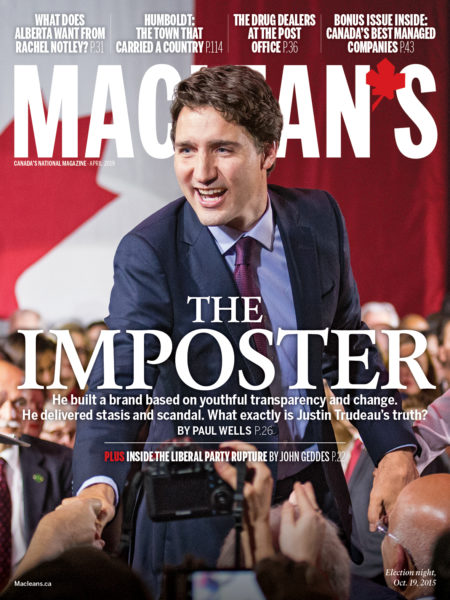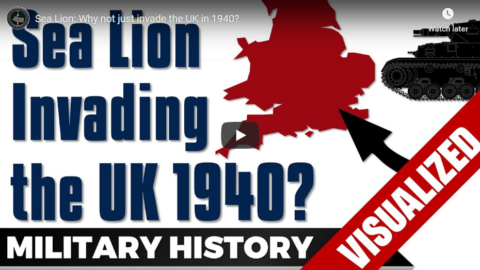Extra Credits
Published on 27 Jul 2019Join us on Patreon! http://bit.ly/EHPatreon
City after city surrendered to Joan of Arc without a fight. Her mission was complete… or was it?
July 28, 2019
Joan of Arc – Thy Kingdom Come – Extra History – #4
“Fantasy Fleet” notions for the RCN
I hate to use the term “fantasy fleet” when linking to a Ted Campbell article … he’s far from being an obsessive who loves amassing lists of cool, gosh-wow hardware, as he’s a retired former army officer who actually does know what he’s talking about on military matters. I apply the term because no matter how sensible and practical these suggestions are (and I largely agree with them on those terms), there is no chance the current government or even a Conservative government under the Milk Dud could stand the political heat they’d take for devoting the kind of ongoing investment a fleet renewal and expansion like this would generate:
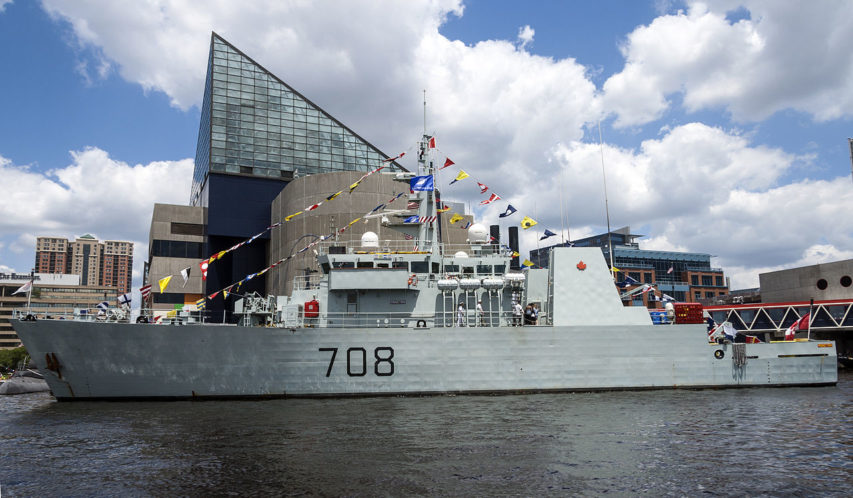
The Kingston-class Maritime Coastal Defence Vessel (MCDV) HMCS Moncton in Baltimore harbour for Sailabration 2012.
Photo by Acroterion via Wikimedia Commons.
… Canada’s 25 years old Kingston class vessels have a range of up to 5,000 nautical miles and can carry unmanned aerial vehicles, but they are slow and are designed for underwater warfare, being fitted with specialist payloads to look for mines and other things on the seabed … The Royal Canadian Navy has said, in the past, that it needs 25± surface combatants (the Navy uses the term “bottoms” when it means surface ships) and Canada has, now, 12 of the 30-year-old (but still lethal) Halifax class frigates and we also have, right now, 12 very useful little Kingston class ships, too. Canada plans (hopes?) to have 12 of the new Type 26 ships in the future, plus 5 of the very large (6,500+ tons) Harry DeWolf class Arctic patrol ships … so we are going from 24 down to 17?
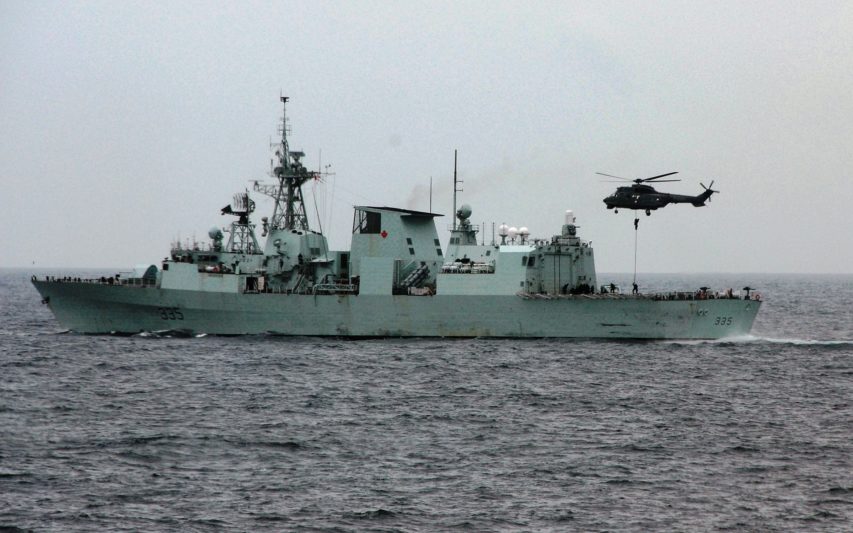
A Chilean navy boarding team fast-ropes onto the flight deck of RCN Halifax-class frigate HMCS Calgary (FFH 335) during multinational training exercise Fuerzas Aliadas PANAMAX 2009.
US Navy photo via Wikimedia Commons.
My guesstimate is that a proper Canadian Navy needs, in addition to supply/support ships, at least:
- 2 or 3 large (25,000± tons) helicopter carrying “destroyers,” (in fact, small aircraft carriers) perhaps like the modern Japanese Izumo-class multi-purpose “destroyers” (pictured below) to conduct multi-purpose operations, including carrying combat-ready specialized amphibious warfare trained soldiers, on a global basis;
- 8 to 12 Type-26 destroyer-frigates (below) ~ I believe (guess) they will also be named for Canadian provinces, cities or rivers or something;
- 6 to 10 modern corvettes (a modern Dutch design is pictured below), 1,500-ton to 2,500-ton vessels, with a 5,000± nautical mile range, each able to carry a helicopter or, at least, a large unmanned aerial vehicle;
KRI Diponegoro (pennant number 365) of the Indonesian navy. The Sigma (Ship Integrated Geometrical Modularity Approach) class is a Dutch modular design that can be built in OPV, corvette, or frigate variants. In 2019, ships of this class are in service with Indonesia, Morocco, and Mexico.
Photo by Wim Kosten via Wikimedia Commons.- 6 to 10 special purpose, ocean-going (i.e. with a range measured in thousands, not hundreds of nautical miles) underwater warfare vessels to replace the Kingston-class ships; and
The lead vessel of the Orca-class in the Gulf Islands on officer training in August, 2007. She is not a commissioned naval ship, so does not bear the HMCS designation. Orcas are not generally armed, but the foredeck has been strengthened to allow an M2 12.7mm machine gun to be mounted if necessary.
Photo via Wikimedia Commons.- 8 to 12 armed “training” ships, about 250 tons (about the same as the Finnish Hamina class) to replace the (fairly new) Orca class vessels, which are not warships. These ships would be, primarily, training vessels, for which there is, always, a pressing need but they could, in emergencies, be used for coastal, constabulary patrol and search and rescue duties, too. The important thing is that they would be real warships, in commission, armed about as well as the Harry DeWolf class ships (which would enhance their training value, too) and, therefore, able to “fight.”
In his ideal world (i.e., not the one we’re living in at the moment), that would be the RCN’s combat fleet. Submarines, logistical support vessels, and (lots of) helicopters would also be required, which would further put this shopping list out of consideration for a Canadian peacetime government.
One thing to keep in mind for most of us civilians, is that warships operate in very rough environmental conditions even in peacetime, and require much more in the way of maintenance and service than your car or pleasure boat. This is why, even if you have a dozen ships “in commission”, you’ll likely only have eight of them available for deployment as the others will be in various states of maintenance and repair. For operations far from home, you really need three ships for each one actually deployed on active service, to account for the back-shop work to keep the ships afloat, fully staffed, and fully capable, plus transit time for the ship itself getting to and from the area of operations, and adequate leave and out-of-combat rest and recreation for the crews.
No Deal… Herr Hitler! – WW2 – 048 – July 27 1940
World War Two
Published on 27 Jul 2019Hitler searches for ways to force Britain out of the war, but the British sit safely behind their cliffs, their channel and their Royal Navy. Engaging the navy and invading Britain would require a major air-superiority. As a result, the Germans plan to knock the British out of the skies. This is the Battle of Britain.
Join us on Patreon: https://www.patreon.com/TimeGhostHistory
Or join The TimeGhost Army directly at: https://timeghost.tvFollow WW2 day by day on Instagram @World_war_two_realtime https://www.instagram.com/world_war_t…
Join our Discord Server: https://discord.gg/D6D2aYN.
Between 2 Wars: https://www.youtube.com/playlist?list…
Source list: http://bit.ly/WW2sourcesWritten and Hosted by: Indy Neidell
Produced and Directed by: Spartacus Olsson and Astrid Deinhard
Executive Producers: Bodo Rittenauer, Astrid Deinhard, Indy Neidell, Spartacus Olsson
Creative Producer: Joram Appel
Post-Production Director: Wieke Kapteijns
Research by: Indy Neidell
Edited by: Iryna Dulka
Map animations: EastoryColorisations by Norman Stewart and Julius Jääskeläinen https://www.facebook.com/JJcolorization/
Eastory’s channel: https://www.youtube.com/channel/UCEly…
Archive by Screenocean/Reuters https://www.screenocean.com.A TimeGhost chronological documentary produced by OnLion Entertainment GmbH.
From the comments:
World War Two
1 week ago (edited)
World War Two is a very complex topic, and even with one or more videos a week, there is a lot of information or context that we don’t get to cover on this channel. That’s why are doing series on the interwar years (1919-1939) called “Between Two Wars” on our TimeGhost History channel. We’re currently in 1929, and we’ll be making generally two thematic episodes for each year of the interwar period. If you want to understand what led up to this massive and destructive conflict, do make sure to check the channel out here: https://www.youtube.com/channel/UCLfMmOriSyPbd5JhHpnj4NgCheers,
Joram
With the SNC-Lavalin affair fading from memory, Justin Trudeau looks set for the fall election
They say that memories are short in politics, but this short? Thanks largely to the dog days of summer and a complicit media desperate for more government subsidies, Justin Trudeau and the Liberals are being allowed to shed the scandal-tainted skin of four whole months ago to emerge glistening and new with election promises galore. Democracy dies in government subsidies, apparently.
On the other hand, perhaps Canadian voters’ memories will last long enough to get past the casting of ballots in October:
Supposedly, the Liberals have put the SNC-Lavalin scandal behind them: the polls have rebounded, the media have moved on, while the company has worse problems to deal with than a mere hair-raising multi-million-dollar corruption charge.
Even the return of Gerry Butts, the prime minister’s former principal secretary, albeit in a part-time, temporary, what-are-friends-for capacity as adviser to the party’s election campaign, seems to have caused little stir, although he was one of two senior government officials to resign over their part in the affair.
Perhaps the Liberals have concluded the passage of time is enough to earn them a pass from the public. I mean this all took place, what, four months ago? Who even remembers that far back?
But as recent events have shown, the same ingredients that combined to produce the SNC-Lavalin scandal — hubris, a maniacal desire to run everything from the centre, and an unwillingness, in all this overweeningness and control-freakery, to be bound by basic legal and procedural norms — remain very much in place in the prime minister’s office.
For starters, there is the affair of the two ex-ambassadors. First, David Mulroney, Canada’s ambassador to China from 2009 to 2012, then his successor, Guy Saint-Jacques, reported a senior official in the Global Affairs department had called them to demand they clear any public comments on the government’s policy towards China with the government.
Both men are now private citizens. Both have been critical of the government’s handling of the China file. Unlike the most recent former ambassador, former Liberal cabinet minister John McCallum, neither has framed his comments on Sino-Canadian relations in terms of what would assist in the re-election of the Liberals. Apparently, that was the problem.
The official, assistant deputy minister Paul Thoppil, claimed to be speaking on behalf of the PMO and explicitly cited “the election environment” as a reason to shut up. Oh, also the current state of “high tension” between the two countries, presumably over China’s seizure of two Canadians as hostages, which supposedly made it essential for everyone in Canada, whether in the government’s employ or not, to “speak with one voice,” i.e., refrain from criticizing the government.
As a China policy, this has the advantage of closely resembling the Chinese way of doing things. It’s hard to say which is the more extraordinary: the notion that private citizens should be compelled to clear their criticisms of the government with the government, or the notion that they could be.
Sea Lion: Why not just invade the UK in 1940?
Military History Visualized
Published on 13 Oct 2017Quite often people remark Hitler should just have finished off the UK before attacking the Soviet Union. Well, there are many problems with that assumption.
»» SUPPORT MHV ««
» patreon – https://www.patreon.com/mhv
» paypal donation – https://www.paypal.com/cgi-bin/webscr…Military History Visualized provides a series of short narrative and visual presentations like documentaries based on academic literature or sometimes primary sources. Videos are intended as introduction to military history, but also contain a lot of details for history buffs. Since the aim is to keep the episodes short and comprehensive some details are often cut.
QotD: Anglo-Italian relations, 1922-1940
The history of British relations with Mussolini illustrated the structural weakness of a capitalist state. Granting that power politics are not moral, to attempt to buy Italy out of the Axis — and clearly this idea underlay British policy from 1934 onwards — was a natural strategic move. But it was not a move which Baldwin, Chamberlain and the rest of them were capable of carrying out. It could only have been done by being so strong that Mussolini would not dare to side with Hitler. This was impossible, because an economy ruled by the profit motive is simply not equal to rearming on a modern scale. Britain only began to arm when the Germans were in Calais. Before that, fairly large sums had, indeed, been voted for armaments, but they slid peaceably into the pockets of the shareholders and the weapons did not appear. Since they had no real intention of curtailing their own privileges, it was inevitable that the British ruling class should carry out every policy half-heartedly and blind themselves to the coming danger. But the moral collapse which this entailed was something new in British politics. In the nineteenth and early twentieth centuries, British politicians might be hypocritical, but hypocrisy implies a moral code. It was something new when Tory M.P.s cheered the news that British ships had been bombed by Italian aeroplanes, or when members of the House of Lords lent themselves to organized libel campaigns against the Basque children who had been brought here as refugees.
When one thinks of the lies and betrayals of those years, the cynical abandonment of one ally after another, the imbecile optimism of the Tory press, the flat refusal to believe that the dictators meant war, even when they shouted it from the house-tops, the inability of the moneyed class to see anything wrong whatever in concentration camps, ghettos, massacres and undeclared wars, one is driven to feel that moral decadence played its part as well as mere stupidity. By 1937 or thereabouts it was not possible to be in doubt about the nature of the Fascist régimes. But the lords of property had decided that Fascism was on their side and they were willing to swallow the most stinking evils so long as their property remained secure. In their clumsy way they were playing the game of Machiavelli, of “political realism”, of “anything is right which advances the cause of the Party” — the Party in this case, of course, being the Conservative Party.
All this “Cassius” brings out, but he does shirk its corollary. Throughout his book it is implied that only Tories are immoral. “Yet there is still another England,” he says. “This other England detested Fascism from the day of its birth… this was the England of the Left, the England of Labour.” True, but only part of the truth. The actual behaviour of the Left has been more honourable than its theories. It has fought against Fascism, but its representative thinkers have entered just as deeply as their opponents into the evil world of “realism” and power politics.
“Realism” (it used to be called dishonesty) is part of the general political atmosphere of our time. It is a sign of the weakness of “Cassius”s position that one could compile a quite similar book entitled The Trial of Winston Churchill, or The Trial of Chiang Kai-shek, or even The Trial of Ramsay MacDonald. In each case you would find the leaders of the Left contradicting themselves almost as grossly as the Tory leader quoted by “Cassius”. For the Left has also been willing to shut its eyes to a great deal and to accept some very doubtful allies. We laugh now to hear the Tories abusing Mussolini when they were flattering him five years ago, but who would have foretold in 1927 that the Left would one day take Chiang Kai-shek to its bosom? Who would have foretold just after the General Strike that ten years later Winston Churchill would be the darling of the Daily Worker? In the years 1935-9, when almost any ally against Fascism seemed acceptable, left-wingers found themselves praising Mustapha Kemal and then developing tenderness for Carol of Rumania.
George Orwell, “Who are the War Criminals?”, Tribune, 1943-10-22.


